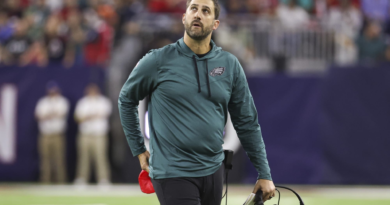The legend of 'Playoff Bob': What Sergei Bobrovsky's teammates (and the stats) say
BOSTON — In the regular season, Sergei Bobrovsky is known as one of the top goaltenders in the NHL, as evidenced by his nomination for the Vezina Trophy, which he has won twice before.
In the Stanley Cup playoffs, he’s known simply as “Playoff Bob.”
Who is Playoff Bob?
“I mean, I don’t even know if there’s one word to describe him,” Florida Panthers defenseman Brandon Montour said. “Focus. That’s a good one, I guess.”
“Ultimate compete. Ultimate preparation,” Panthers defenseman Aaron Ekblad said. “His calm and coolness in the net under any circumstances.”
“He’s just on another level,” Florida captain Aleksander Barkov said.
That’s the perception of Playoff Bob. It’s reinforced by incredible postseason saves like his diving stop in the first round with his back turned to center ice, which was immortalized on a T-shirt as “The Bobbery.”
0:36
Sergei Bobrovsky makes unbelievable save to deny Lightning
Check out this sensational save from Panthers’ Sergei Bobrovsky in Game 2 vs. the Lightning.
But the reality of Playoff Bob, at least in the 2024 postseason, is different from the perception.
Sure, he’s 7-2 for the Panthers, who are one victory away from advancing to the Eastern Conference finals for the second straight season. He has a 2.55 goals-against average, which ranks him fifth among goalies with at least six postseason appearances. But those are largely team-driven stats for a goaltender.
From an individual perspective, Bobrovsky has a .892 save percentage, which ranks eighth out of nine goalies with at least six appearances. Only Stuart Skinner of the Edmonton Oilers ranks lower (.877), a goaltender whose status for Game 4 against the Vancouver Canucks is uncertain due to his ineffectiveness.
Money Puck has Bobrovsky at 0.5 goals saved above expected. Stathletes has him at minus-1.3 goals saved above expected in all situations. Natural Stat Trick has Bobrovsky at minus-1 goals saved above average. His save percentage vs. expected save percentage (-0.70) is 11th in the postseason.
So based on all of that, who is Playoff Bob?
“He’s at a point in his career where he should be oblivious to the stats,” Panthers coach Paul Maurice said. “They don’t matter. His stats won’t be good, but his play is fantastic.”
THIS IS BOBROVSKY’S 14th NHL season. His NHL run started in 2010-11 with the Philadelphia Flyers, who signed him as a free agent out of the KHL. After two seasons in Philadelphia, and one season under big-ticket free agent signing Ilya Bryzgalov, the Flyers traded him to the Columbus Blue Jackets, where Bobrovsky blossomed: He won the Vezina Trophy in his first season in Columbus (2012-13) and then again in the 2016-17 season.
He was signed away from the Blue Jackets by then-Florida GM Dale Tallon on a seven-year, $70 million contract with full trade protection. The size of that contract weighed on him during his first couple of seasons in Florida, but Bobrovsky was a big reason the Panthers became a Stanley Cup contender.
While his career save percentage in the regular season (.915) is higher than in the postseason (.904), he earned the Playoff Bob reputation with a couple of impressive series wins. In 2019, he backstopped the Blue Jackets to a first-round sweep of the Tampa Bay Lightning in one of the biggest upsets in NHL history. In 2022, he battled for a six-game series win over the Washington Capitals, the first playoff series win for the Panthers franchise since its appearance in the Stanley Cup Final in 1996.
Last season, Bobrovsky had a .915 save percentage in leading the Panthers to the Stanley Cup Final again, where they lost to the Vegas Golden Knights. Alex Lyon started the postseason for the Panthers after helping to lead them to a playoff berth in the regular season. Bobrovsky replaced Lyon during Game 3 of the first round and helped them win two critical road games, including Game 7.
But the highlight of his postseason was Game 1 against the Carolina Hurricanes in the conference finals: a four-overtime epic in which Bobrovsky stopped 63 of 65 shots in full Playoff Bob mode.
“At that point you don’t feel much about your body. It’s more mental,” he said at the time. “Your focus is completely on the game. One shot at a time and you don’t think about your body.”
No goalie faced more shots than Bobrovsky last postseason (639), including 31.2 per game at 5-on-5 — a total inflated a bit by overtime games. This playoff run from the Panthers couldn’t be more different: Bobrovsky is facing just 22.9 shots per game.
The good news is that the Panthers are a much better defensive team year over year, tying the Winnipeg Jets for first in the NHL with a 2.41 goals-against average in the regular season.
But this presented a new challenge to Bobrovsky: getting to his game, and staying on his game, without facing anything close to his previous shot volume.
“He’s not on his A-plus-game right now, but I think he’s playing well,” said Kevin Weekes, ESPN analyst and former NHL goaltender. “It’s different because there’s not a lot of volume. It’s hard to get in and stay in the rhythm in any game right now.”
Weekes said that goalies use shots from a distance to get into a rhythm. “Some clear out point shots where you can make a clean save and get the feel,” he said.
“It’s weird. For the most part, Florida’s dominating. And then when they do give up some chances, they’re kind of Grade A,” he said.
Maurice said that quality vs. quantity change was on full display in the Panthers’ first-round win over the Lightning.
“I think we really noticed it in the Tampa series. Those guys hang on at pucks. They’ve got so much deception in their game. Their shot numbers weren’t high, but they were just so dangerous,” he said. “I feel that a guy that doesn’t have the experience that Bob has would’ve a difficult time doing what Sergei’s been able to do.”
Weekes saw something similar.
“It’s very different than it was last year, because last year he was like stealing games and they were giving up a lot more in the playoffs,” he said. “So far, certainly in this round and even against Tampa, he’s not getting as much volume. It’s a tougher way to stay busy and to stay sharp as easily.”
THERE’S A LOT of psychology involved in Bobrovsky’s postseason workload.
First, there’s his own mentality. Without facing shots to keep him sharp, Bobrovsky (who declined to comment for this story) has had to remain engaged mentally in different ways.
“I believe that he has a mental program that he’s running in those long stretches of time because he’s done it before,” Maurice said. “He’s so routine in what he does, so he would have a routine in the net for staying sharp and staying mentally alert.”
Another mental hurdle for Bobrovsky is the realization that his numbers aren’t going to be as stellar as they’ve been in seasons past.
“I think it’s been an incredibly difficult start for him in the playoffs,” Maurice said. “I don’t mean the quality of his play. He made some saves that we’ll probably be seeing for the next 10 years, like the backhand spin-around. But Tampa Bay is really difficult to game because they have the [David] Pastrnak level of skill [but] they don’t shoot every puck. So the numbers aren’t going to look good against Tampa. They’re not putting up 50 shots.”
When opponents aren’t putting up shots, that can also have a psychological impact.
Maurice recalled when his teams would face Hockey Hall of Famer Martin Brodeur, whose New Jersey Devils teams would prevent shots on goal for long stretches.
“I remember we were going to play New Jersey back in their prime and walking by the door and I hear [former NHL player] Nelson Emerson say, ‘We’re probably only getting three chances tonight, fellas. We’ve got to make good on them,'” recalled the coach.
One goaltending analyst told ESPN that Bobrovsky has an aura about him that makes opponents feel they have to capitalize on the chances they get to score on the Panthers netminder.
“The numbers don’t say he’s dominating. Right,” the analyst said. “But I feel like he’s so mobile, he’s so explosive that there still can be an intimidation factor.”
The final psychological impact of Playoff Bob is on his teammates. For the players on the ice, it’s the way that Bobrovsky can turn his performance around in a single game. Look no further than Game 4 against the Boston Bruins, when he gave up two goals on five shots in the first period, and then didn’t allow a goal for the rest of the game.
“That’s who he is. It’s funny: It’s cliché with every team. You always tell your goalie to shut the door and we’ll get this one back for you,” Panthers forward Evan Rodrigues said. “A lot of people say that, but it feels like when we do, he goes out and actually does it. He’s been incredible for us all year. Steady as can be. Game 4 was another example of it.”
Playoff Bob serves another purpose for his teammates: A great performance in goal could mean less scrutiny of their own mishaps in a victory.
“You don’t have to go to therapy as much, right?” Maurice said. “If he doesn’t [play well], you’re in team therapy, you’re in the video room going, ‘You made these four mistakes and that’s why the goal went in.’ And then if he stops it, we pat them on the back and say, ‘Great job.’ And nobody talks about the mistakes. So there are fewer therapy sessions when he’s playing like that.”
Such is the impact of Playoff Bob.




